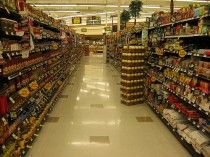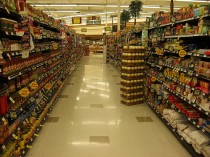Campaigners call for sustainable soya supermarket sweep
The World Wildlife Fund have highlighted the effect of increasing global soya demands on the Brazilian ecosystem where they are cultivated. They urge businesses to take notice by thinking about the soya supply chain.

 Supermarkets and businesses are being urged to stock sustainable soya. An environmental group says this is necessary to avoid loss of Brazilian wildlife on a “similar scale to destruction in the Amazon”.
Supermarkets and businesses are being urged to stock sustainable soya. An environmental group says this is necessary to avoid loss of Brazilian wildlife on a “similar scale to destruction in the Amazon”.
A World Wildlife Fund (WWF) report has highlighted the impact of a growing global demand for soya on the Cerrado, a little-known sensitive savannah ecosystem in Brazil.
The Cerrado is responsible for 5% of the world’s biodiversity. It is currently experiencing habitat destruction at a faster rate than the Amazon because of growing worldwide demand for soya beans, according to the study.
WWF is calling on supermarkets, producers and farmers to sign up to organisations which set strict environmental and social standards for soya cultivation such as the Round Table for Responsible Soy (RTRS).
RTRS set requirements for soya production such as the protection of biodiversity and native forests as well as ensuring fair working conditions for local labour.
The UK imports over 70% of its soya directly from Argentina and Brazil. Production of the crop has doubled over the past 15 years because of meat consumption as well as use in biofuel and other products.
Roundtable certified soya is available for sale for the first time this year and WWF is hoping the sustainable soya initiative will expand with help from British businesses.
WWF claims that the area planted with soya in Brazil is already the size of the United Kingdom. The study says that CO2 emissions caused by habitat conversion in Cerrado are more than half the UK’s entire CO2 emissions over the last two years.
The report says the area is home to 11,000 species, with around 44 per cent of those exclusive to the Cerrado.
Isabella Vitali, Senior Policy Officer on Livestock and Soya at WWF-UK, said: “Through the consumption of livestock raised on soya, UK consumers may be unwittingly contributing to the destruction of some of the world’s most valuable habitats.”
“RTRS can be an effective way of tackling the problems associated with soya expansion and help to preserve unique habitats for future generations.”
Ms Vitali explained other ways that the impact of soya expansion can be mitigated, including “changes to diets, cutting down on waste, and supporting effective legislation to protect valuable habitats.”
Last Wednesday (25 May) saw the start of legislation in Brazil which would loosen restrictions on how farmers use land in the Amazon. Small scale farmers say that it will help them to increase Brazil’s food output and make more money. Environmental campaigners believe that if the bill goes through it could lead to increased deforestation and flooding.
Ms Vitali called these plans the “biggest threat to Brazilian forests in recent history”
Last Tuesday (24 May) a rainforest activist in Brazil who fought against illegal loggers in the Amazon was shot dead.
Image: Anthony Starks | Flickr
The full WWF report, Soya and the Cerrado:
Round Table on Responsible Soy Association
Guardian report: Brazil loosens restrictions on amazon land use






